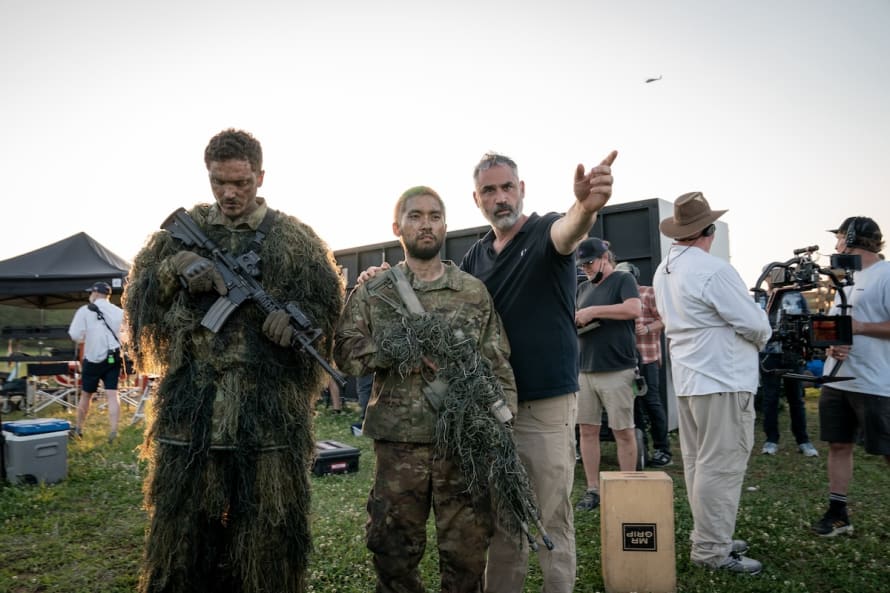"I'm trying to have a conversation, as opposed to a lecture," Alex Garland tells Exclaim! while in London, UK promoting his latest film, Civil War. "Film is a broad church. There are many, many films out there that will set up questions and dutifully answer with great clarity. I had reasons not to make this film like that."
Although Garland's movie has grabbed headlines for its depiction of a fallen America since its premiere at SXSW in March, the driving force behind the director's intentions and ambiguity centres on journalism. Specifically, "The nature and importance of journalism — the necessity of journalism."
In the film, Kirsten Dunst stars as Lee, a road-weary war photojournalist who, along with her colleague Joel (Wagner Moura), sets out on a road trip across the US to the White House. Accompanied by their aged mentor and a young, aspiring photojournalist, the four trek across the war-torn country in the hopes of speaking with the president, played by Nick Offerman, before his inevitable capture.
Garland presents a nation divided, where the government has turned on its citizens, with the only resistance coming in the form of the Western Forces, a separatist regime led by a Texas–California alliance. Anyone with a passing knowledge of American politics — or even a Twitter/X account during election time — will understand these two states to seemingly occupy opposing ends of the spectrum, politically and philosophically.
A closer look, however, reveals the similarities between Texas and California; after all, these are two states with massive economies, strong self-identities and frequent disagreements with the federal government. But Garland's purpose behind this pairing goes beyond the reality of current-day politics.
"They consider [there] to be a greater problem than their political disagreements," Garland acknowledges, while also pushing it a step further. "Now, the inference is: are you unable to conceptualize that? Are you saying that political disagreements would be a greater force and of greater importance than a fascist, Constitution-smashing president?"
Just as the filmmaker carefully avoids aligning any character or side of the fictional conflict to either conservative or liberal beliefs, Garland doesn't provide any answers to these questions within the film. The only clear statement Garland makes is, "The president is a fascist. The president has dismantled the Constitution, is bombing American citizens, has removed one of the law enforcement pillars, which actually would be a pillar that would be able to investigate the president."
He continues pointedly, "[The president] is essentially functioning like a fascist, which means he's a fascist."
Civil War invites audiences to reconcile at what point do political differences fall to the wayside, and what role journalism plays in encouraging and discouraging this exercise.
The British writer-director grew up around journalists. His father was a political cartoonist for The Daily Telegraph in the 1960s through to the 2010s, and his and his brother's godfathers were foreign correspondents. It's a profession Garland displays a distinct reverence for in terms of what it can potentially contribute to society at large, and his desire to keep the film as opaque as possible mirrors the core principles of journalism.
"Effectively, [the film] functions like old-school journalism, which is reporting without bias," says Garland. "Obviously, modern news contains a lot of bias in its institutions, or whatever it happens to be."
With Civil War, Garland hopes to sidestep the biases that come with the political frenzy many countries around the world currently operate within. Instead, he challenges viewers to consider issues on their merits, or lack thereof.
"I'm crediting the audience with stepping forward to the film and involving themselves and their own thought processes, without trying to shut them down," Garland explains. "We're trying to make [them] part of the dialogue, I suppose."
By doing so, Garland has created the sort of film he personally enjoys watching. He says, "My favourite film I saw last year was Anatomy of a Fall. I absolutely loved that film. One of the things I loved about it was I felt like I was being treated like a sentient grown-up, and I just appreciated that."
He adds with a laugh, "Because I'm 53. I am a sentient grown-up."
